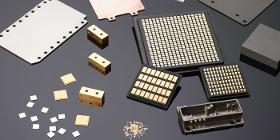- europages
- >
- COMPANIES - SUPPLIERS - SERVICE PROVIDERS
- >
- copper
Results for
Copper - Import export

AMETEK SPECIALTY METAL PRODUCTS
United States
We manufacture bar and tube products in our corrosion resistant Spinodal alloy, Pfinodal® (C72900), for use in downhole housings, centralizers, and joints that operate in demanding subsea environments. Advantages Our Copper nickel tin Pfinodal® (C72900) bar and tube products present a combination of unique properties that deliver significant advantages for downhole oil and gas applications. Non-sparking and non-magnetic Anti-galling Anti-corrosive Heat treatable to high hardness Safe alternative to Beryllium Copper (BeCu) Pfinodal ® (C72900) Bar and Tube C72900 copper alloy materials are available in bar and tube sizes up to 6” (152.4mm) diameters as well as in both strip and plate products. Our C72900 material is generally provided as machining bar in the aged condition with many sizes available to ship from inventory. We also offer the ability to provide turnkey solutions by providing fully machined parts to OEM drawings.
Request for a quote
AMETEK SPECIALTY METAL PRODUCTS
United States
AMETEK Specialty Metal Products has led the industry in the production of Pfinodal® (C72900), a highly specialized Spinodal alloy, with superior bearing properties. Our production processes and heat treatments combine to ensure the high hardness required in tough drill bit material for bearing components such as sleeves, bushings, washers and caps. Our Pfinodal® (C72900) bearing materials has been in use for 20 years under patent numbers 5527113 and 5552106 for these rock bit bearing applications. Advantages The near-net shape processing of our Spinodal materials eliminates waste thereby reducing cost for the finished product. We specialize in offering the turnkey solutions of materials that are machined, plated and packaged to your specifications. These can be shipped to your facilities around the world for incorporation in the bits, reamers and equipment needed to power the world.
Request for a quote
AMETEK SPECIALTY METAL PRODUCTS
United States
Our Electrolytic Copper (C11000) shaped wire is used in magnetic applications such as superconductors in MRI scanners that require high copper content and rectangular cross sections. Electrolytic copper wire products have engineered channels to accept round superconducting wire such as Nb based low temperature wires. We have the expertise to manufacture C11000 copper wire to your exacting specifications and wire shapes. Advantages Our C11000 material for channel wire is produced in long lengths to minimize joints and is tightly tolerance to ensure field integrity. Advantages include: Sophisticated powder metallurgy process achieves high purity, consistency and close composition control Improved die wear, formability and platability Superior dimensional control Stringent quality control to ISO 9001
Request for a quote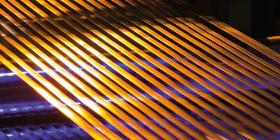
AMETEK SPECIALTY METAL PRODUCTS
United States
Copper 102 is an oxygen-free copper with extremely high electrical conductivity and good formability. These characteristics make it particularly useful for electrical connectors. Copper 102 can be deep-drawn from the annealed temper.It is corrosion resistant in normal atmosphere and water. A thin adherent oxide film forms at elevated temperatures which prevents particle contamination and enhances glass to metal seals. The Copper 102 can be readily soldered and brazed. The absence of oxygen makes welds free of inclusions. Available Sizes: Copper 102 is available from Hamilton Precision Metals as strip product in thicknesses from 0.0005” to 0.010” (0.0127 mm to 0.254 mm) in widths up to 12.0” (304.8 mm). The material conforms to ASTM B 152 and UNS C10200. It is also available in thickness less than 0.0005” (0.0127 mm) in widths up to 4.000” (101.6 mm) maximum.
Request for a quote
AMETEK SPECIALTY METAL PRODUCTS
United States
Our specialized Pfinodal® C72900 material is a Spinodal copper based alloy with nickel and tin additions. It competes with Beryllium Copper alloy C17200 for electrical connectors and bearing materials where high strength and excellent formability without dimensional instability are required.
Request for a quote
AMETEK SPECIALTY METAL PRODUCTS
United States
Our Spinodal materials are custom-engineered for safety hand tools that are non-sparking, non-magnetic and highly corrosion resistant. They benefit from age hardening techniques that further increase their strength and hardness for high performance safety tools. Alloys AM 388™ (UNS C72650) is a copper based Spinodal alloy that offers non-sparking, non-magnetic and high strength properties. AM 388™ is accepted as a safe replacement material for Beryllium Copper alloy. Safety Tool Applications Engineered for an array of hand-held non-sparking safety tools including: Corrosion resistant wrenches Hammers, axes and picks Corrosion resistant screwdrivers, pliers and spatulas
Request for a quote
AMETEK SPECIALTY METAL PRODUCTS
United States
AMETEK Specialty Metal Products has been a leader in the development of shaped wire products for use in orthodontic brackets for more than 20 years. Whether orthodontic materials are needed for a new design process to increase torque strength in orthodontic brackets, or support for a highly customized next generation project, our engineers are ready to work with you to ensure success. Advantages As a world class metal wire manufacturer, we deliver custom wire shapes, custom wire alloys and precise sizes. Our shaped wire products deliver major advantages for the manufacture of near net shape orthodontic brackets. These include: Superior dimensional control for precision bracket geometries that reduce occlusal interference and improve patient comfort Tightly controlled alloy purity, consistency and composition for improved performance Improved die wear, formability and platability Highly customized materials enable increased torque strength
Request for a quote
AMETEK SPECIALTY METAL PRODUCTS
United States
Our highly specialized Spinodal materials are custom-engineered for electronic connectors and deliver major advantages in comparison to traditional materials such as Beryllium Copper (BeCu). We offer precision strip and wire products in alloy Pfinodal® (UNS C72900), a copper nickel tin Spinodal alloy, for the manufacturing of high performance electronic connectors in the electronics industry. Safe Alternative to Beryllium Copper (BeCu) Beryllium Copper (BeCu) materials are the historical choice for electronic connectors. Our high performance Pfinodal® (UNS C72900) delivers similar mechanical properties to Beryllium Copper but without the harmful exposure risks.
Request for a quote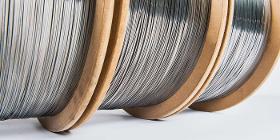
AMETEK SPECIALTY METAL PRODUCTS
United States
AMETEK Specialty Metal Products employs a wrought powder metallurgical process to manufacture custom gauge and width strip materials used as the outside sheathing of flux cored wire and metal cored welding wire. Advantages Our high purity process allows production of wire sheathing materials with significant advantages for flux cored welding wire producers, compared to a conventional casting process. These include: Very high ductility Tight and repeatable chemistry control Availability of unique and custom chemistries High purity material for improved tool and die life Corrosion, wear and high temperature resistant Short lead times and small batch sizes Find a consolidated listing of our metal sheathing materials in our Weld Wire Sheathing Brochure. Chemistry Control We tightly control the chemistry of the incoming raw materials to ensure that trace elements are kept to a very low level. Our wrought powder metallurgy process allows chemistry flexibility
Request for a quote
AMETEK SPECIALTY METAL PRODUCTS
United States
As a leading metal wire manufacturer, we engineer high tolerance custom shaped wire and flat wire products in a wide range of standard shapes in addition to custom shapes. The range of alloys available is nearly endless with choices from our own high purity wrought powder metallurgy alloys (nickel wire, Pfinodal® wire, Sealvar®, and Nickel Irons). We also process materials from nearly any metal wire manufacturer or rod producer on the planet including stainless wire, steel wire, aluminium wire and more. A comprehensive review of these materials can be found in our Shaped Wire Brochure Standard Shaped Wire Standard shaped wire is available from on-site tooling in round, square, and flat wire products. Edges of flat wire products can be profiled with square, rolled rounded edges, natural round edges or fully blended round edges. Applications for standard shaped wire include
Request for a quote
AMETEK SPECIALTY METAL PRODUCTS
United States
We offer two Spinodal alloy grades produced through the same wrought powder metallurgy as copper based products with nickel and tin additions. Our Pfinodal® (C72900) and AM 388® (C72650) spinodal materials deliver similar mechanical properties to Beryllium Copper alloy (C17200) but without the carcinogenic exposure risks. Advantages include: No carcinogenic elements - only copper/nickel/tin Ductile state and heat treatable Electrically conductive Reduced distortion during heat treatment Reduced stress relaxation Safe Alternative to Beryllium Copper (UNS C17200) Recently, Pfinodal® and AM-388® have been chosen as a replacement for Beryllium Copper due to the carcinogenic effects of Beryllium and fears of bans on Beryllium containing products due to REACH, RoHS, and OSHA mandates. Spinodal materials are gaining acceptance in new projects as well as legacy qualifications as manufacturers, OEMs, and consumers reject products
Request for a quote
AMETEK SPECIALTY METAL PRODUCTS
United States
Beryllium Copper 25 is a Copper base alloy with the capability of being strengthened by precipitation heat treatment. The alloy furnishes the best combination of electrical conductivity, corrosion resistance and mechanical strength necessary for numerous electronic and electromechanical devices. The alloy is quite satisfactory for fabrication with good formability and joining characteristics. Forming is readily accomplished from the annealed temper. Severe bending will be less successful from hard or heat treated tempers and requires large fold radius ratios. Beryllium Copper 25 is able to be soldered, brazed, and welded by most standard techniques. The brazing temperature must be kept under 1450º F and cycle time minimized to avoid loss of heat treated strength. Heat treating should be performed subsequent to welding to obtain uniform high strength. The alloy is not susceptible to an increase in magnetic attraction from plastic deformation during service
Request for a quote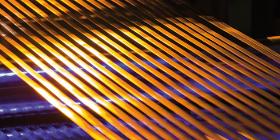
AMETEK SPECIALTY METAL PRODUCTS
United States
Shunt Manganin is a Copper-Manganese resistance alloy used for shunts in various high current applications. The alloy has a low temperature coefficient of resistivity with peak resistance at about 50°C. The thermal EMF vs. Copper is very low. The alloy can be easily formed from the annealed temper.The maximum recommended operating temperature in air is 200°F. Available Sizes: Shunt Manganin is available from Hamilton Precision Metals as strip product in thicknesses from 0.0005 to 0.053” (0.0127 mm to 1.346 mm) in widths up to 12.0” (304.8 mm). It is also available in foil as thin as 0.000100” (0.00254 mm) in widths of 4.0” (101.6 mm) maximum.
Request for a quote
AMETEK SPECIALTY METAL PRODUCTS
United States
Cu-Ni 715 is a copper-nickel alloy that is resistant to corrosion in sea water. The alloy has good fatigue strength and relatively high thermal conductivity. This alloy is used mainly for flexible metal foil heaters. The alloy is readily formed in the annealed temper, and can be joined by the standard welding, brazing and soldering processes. Available Sizes: Cu-Ni 715 is available from Hamilton Precision Metals as strip product in thicknesses from 0.0005” to 0.010” (0.0127 mm to 0.254 mm) in widths up to 12” (304.8 mm). The material conforms to ASTM B122 and UNS C71500.
Request for a quote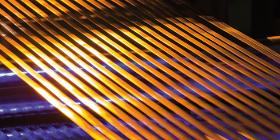
AMETEK SPECIALTY METAL PRODUCTS
United States
Copper alloys exhibit very high electrical and thermal conductivities, offering twice the conductivity of aluminum and thirty times the conductivity of stainless steel. Other advantageous characteristics include outstanding strength (notably copper beryllium alloys) and corrosion resistance as well as antimicrobial properties. Copper is most commonly used in electrical and electronic applications.
Request for a quote
AMETEK SPECIALTY METAL PRODUCTS
United States
Constantan® is a copper-nickel alloy that contains specific minor amounts of additional elements to achieve precise values for the temperature coefficient of resistivity. Careful control of melting and conversion practices results in a very low level of pinholes at ultra-thin thicknesses. The alloy is used extensively for foil resistors and strain gauges. The TCR can be adjusted from the furnished cold rolled values by using a low temperature heat treatment to achieve compensation for all types of spring elements. The foil is normally supplied with 90% cold reduction and a smooth bright surface. The foil is reasonably flat at 4” wide and nearly free of pinholes. The cold rolled foil can be produced with a TCR between +10 to –35 PPM/°C. The heat treatment will shift the foil TCR to the desired value. A typical heat-treat curve for Constantan® shows decreasing resistivity but increasing TCR with increased heat-treating temperature.
Request for a quoteDo you sell or make similar products?
Sign up to europages and have your products listed
Results for
Copper - Import exportNumber of results
18 ProductsCountries
Company type
